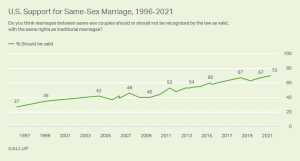The complete article is available here.
For many years now — perhaps around 80 — Americans’ thinking has been influenced by an ideology that has chipped away at the idea of objective reality and has reinforced the concepts of subjectivity and relativism.
This “tied-to-no-set-of-fixed-principles” perspective has increased over time and, especially during the 21st century, clearly has become society’s consensus point-of-view. It especially can be seen in the nation’s changing attitude toward same-sex marriage over the last seven years, and even longer.
Research from 2021 and earlier shows that
U.S. support for legal same-sex marriage continues to trend upward, now at 70% — a new high in Gallup’s trend since 1996. This latest figure marks an increase of 10 percentage points since 2015, when the U.S. Supreme Court ruled that all states must recognize same-sex marriages.
For more articles echoing this trend, visit this page.
To what can we attribute the rapid and widespread change in public opinion? Again, we note that to the American population in general, very few things are fixed and immovable. In other words, hardly anything is absolute.
I believe the tenor of the national conversation about same-sex marriage has, through the years, reinforced the perception that marriage is whatever the state says it is, and even whatever people want it to be. Gallup’s survey question illustrates this well. The research organization’s own question presupposes several things about marriage that simply are not true. Note the question:
Do you think marriages between same-sex couples should or should not be recognized by the law as valid, with the same rights as traditional marriages?
Consider the following three items that address Gallup’s question and, more broadly, the discussions Americans have had over the last 20 years about marriage and redefining it.

First, marriage, by its very definition, is a lifelong commitment between one man and one woman, but Gallup’s survey question assumes same-sex couples can be married even without state recognition: “Do you think marriages between same-sex couples should or should not be recognized by the law as valid…?” This is push polling!
Opinions, however — and even government recognition or lack of it — do not, and in fact cannot, determine the definition of marriage. Here’s an illustration that will help convey what marriage really is. If you are fortunate enough to be served a slice of your favorite kind of cake for dessert after a meal, will you be eating cake, or its ingredients? The answer, of course, is both! You can’t consume the cake without also consuming its ingredients. Similarly, you can’t have a marriage without a man and a woman; one man and one woman provide the core “ingredients” of a marriage. Therefore, if you’re talking about a same-sex couple, you absolutely cannot be talking about a marriage or a potential marriage. Crusaders for government recognition of same-sex relationships as marriages used emotional appeals; but their persuasive talk, however compelling, never could change reality. As Chuck Colson astutely observed in a 2003 BreakPoint commentary, “The argument…is that to deny homosexuals marriage is manifestly unfair. But it’s not unfair. Gays and lesbians are not unworthy of marriage; they are incapable of marriage.”
The argument…is that to deny homosexuals marriage is manifestly unfair. But it’s not unfair. Gays and lesbians are not unworthy of marriage; they are incapable of marriage.
—Chuck Colson—
Second, Gallup’s question assumes that the state has the power to grant the “marriages” of same-sex couples the same “rights” afforded the marriages of opposite-sex couples. Sure, government can pretend a same-sex couple has a marriage relationship. It can adjust and manipulate its laws to recognize the relationship of two men or two women as a “marriage.” But it cannot do this without participating in and sanctioning a lie. This is the case, first and foremost, because of what a marriage intrinsically is.
Further, nature and reality bar certain rights, privileges, and abilities inherent in natural marriage from same-sex couples, regardless of what their relationships are called. I remember hearing of a state lawmaker who voted for his state to recognize same-sex relationships as marriages because his son was a homosexual and in a relationship with a man he wanted to “marry.” The lawmaker felt compelled to vote in favor of same-sex “marriage” because he felt it would be unfair to deprive his son the kind of relationship he and his wife had had through the years. My thought was, If you think your son can have with another man the kind of relationship you’ve had with your wife, you are sadly mistaken. To borrow from Chuck Colson, we can say that isn’t that same-sex couples been denied that kind of relationship, it is that for them, having that kind of relationship simply isn’t possible.
Here’s the truth. Both the obvious and subtle differences between men and women create a dynamic in marriage that makes it a marriage. Of course, the most obvious capability a heterosexual couple has that same-sex couple does not and cannot is that of having their own children. Can the state wave a wand and make it possible for two men or two women to procreate? No — not like an opposite-sex couple can.

Of course, we are aware of ways to bypass the normal process, including adoption and surrogacy. The state certainly can manipulate those and make them more accessible to same-sex couples; but I submit to you that this requires the state to manipulate the playing field unnaturally so as to create, not a reality, but only an appearance of one. And the absence of healthy elements will be detrimental to the children involved. We’re talking here about children deprived of either a mother or a father by government decree and design.
There’s more! It won’t be just the children of same-sex couples who are harmed, regardless of how loving and caring same-sex couples might be in their parenting. Parental rights across the board will inevitably be affected, as well as the rights children born to married heterosexual couples. You see, “marriage equality” means all marriages will be treated by the state as a same-sex marriage. Hear attorney Jeff Shafer on the matter, from a Cross Politic video (courtesy of David Fowler).
Not coincidently, this conversation echoes the urgent need for the state and society to acknowledge fixed realities regarding marriage, family, and parenting — otherwise, the state inevitably will become the absolute, and tyrannical, authority dictating what these are and what they can an cannot be. As a nation, we are barreling down this road right now, even as you read these words.
Third, in a practical sense, Gallup’s question presupposes that the state has absolute authority to adjust, manipulate, and redefine marriage, despite what marriage is inherently and has been since the dawn of creation. As the Pledge in Solidarity to Defend Marriage so eloquently stated,
Marriage is ontologically between one man and one woman, ordered toward the union of the spouses, open to children and formative of family. Family is the first vital cell of society, the first government, and the first mediating institution of our social order. The future of a free and healthy society passes through marriage and the family.
Marriage as existing solely between one man and one woman precedes civil government. Though affirmed, fulfilled, and elevated by faith, the truth that marriage can exist only between one man and one woman is not based on religion or revelation alone, but on the Natural Law, written on the human heart and discernible through the exercise of reason. It is part of the natural created order.
Remember that we’ve been considering Gallup’s survey question because it illustrates the nature of the national conversation that has taken place about same-sex marriage. We are not far off when we suggest that the national conversation was rigged in favor of same-sex “marriage,” because so much of the rhetoric promoting it was similar to the question Gallup asked. The national conversation, or debate (if we can call it that), assumed numerous things to be true about marriage that simply were and are totally false. No doubt the countless references to same-sex relationships as “marriages” or potential “marriages” — in multiple surveys, news outlets, and in general conversations — have both contributed to and reinforced grave misunderstandings about what marriage is, and consequently, in people’s minds, what it can become through government action.
*********************
This is the end of the excerpt, but before finishing I’d like to raise another aspect of the national discussion and comment on it. Many well-meaning people mistakenly believe that same-sex marriage and religious liberty can co-exist in America. Even before the Obergefell ruling was issued by the Supreme Court on June 26, 2015, Professor Robert George explained that ultimately these two cannot coexist. Why? Because to treat a same-sex relationship as a “marriage” is to deny the reality that marriage and procreation are two tightly woven strands that make up one cord. It is to pry apart procreation from marriage, effectively making marriage something it is not and never has been — merely a relationship of two people authorized and recognized by the state. Here is Professor George’s observation on the matter. This clip was lifted from this presentation, given in 2015.
Copyright © 2022 by B. Nathaniel Sullivan. All rights reserved.
top image credit: Photo by Joel Wyncott on Unsplash


